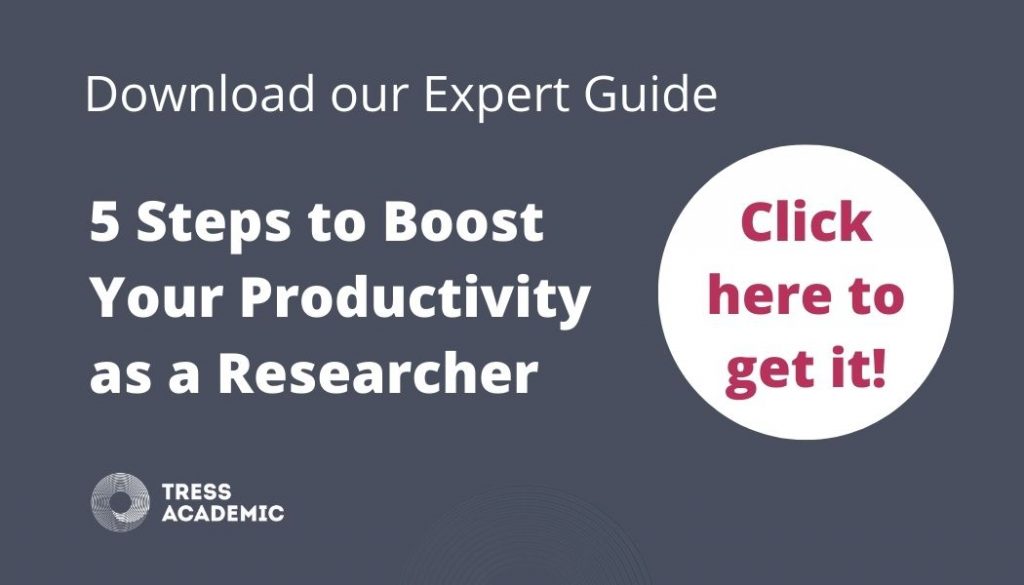Are your deadlines staring you down like a lion waiting to pounce? Deadline dread is an all too real problem for many researchers, with all real consequences. If you’re tired of the last minute panic, sleepless nights and missed appointments, read our 7 steps to avoid disaster.
Working in research, you are often faced with deadlines for completing something or to handing something in. It might be a conference paper, a poster, a research application, or a deadline that you have to meet to exchange a research outcome with your project partners in a larger consortium. But what can so often happen is: You know about the deadline for some time, but the days, weeks or months pass by, and then you ‘suddenly’ realise that the deadline is so close now that you may not be able to make it on time anymore!
Panicking, you kick into your ‘emergency mode’ – which means you work all day long, as quickly as possible, and under high pressure. You’re missing out on dates with friends, drop meals, stop playing with your kids in the evenings, and stretch bedtime hours to squeeze in a few more working hours. And then . . . completely exhausted, you make it in the very last hour and send off your work with seconds to spare! It’s done, you’ve made it, but not in a good way. You swear you’ll get better at handling deadlines, and to never ever work this way again. But, as the next deadline looms, you put it off a little longer… and you don’t really know how to break out of the habit.
Fear not! Most of us have been there as well – and we want to share a little story about our experiences with you. But most importantly, we’ll show you the lessons we’ve learned from our own mistakes with these ‘seven easy steps to avoid ‘deadline disaster’. So you can get better at handling these pesky deadlines, while working at your normal pace and submitting your work without wrecking your nerves.
Our story:
When we were working as researchers at a Dutch research institute, we were invited to give a keynote speech at a conference together with our colleague, a Norwegian professor. It was not just ‘any conference’, but an important international meeting in Landscape Ecology (our field). The event was also to be attended by politicians, opening the chance for potential future collaborations and funding opportunities for us as scientists. Being invited to give a keynote was an honour and a great chance!
So we had known for a long time when the congress would take place, and what we had to deliver. We met a couple of times with our Norwegian colleague to choose a topic for our talk, discuss details, and work on the outline of the presentation. But time passed by and – believe it or not – our keynote was not ready the day before we had to leave for the conference.
We worked as much as we could during the flight from the Netherlands to Seattle (US) where the conference took place. We were still not ready upon arrival and it took us another nights work (!) to get the presentation done and dusted. It was ready a mere few hours before we had to go on stage in front of 250 colleagues.
When we finished, we were stressed-out and exhausted! What could have been an easy-going pre-conference time of relaxation, and a moment of pride and joy in our academic careers, turned into a nightmarish 48h working-marathon! Phew! That was a turning point for us, because – from then on, we have changed our working habits for the better! We hardly ever get in trouble with looming deadlines anymore.
But what’s the reason that it’s so troublesome to meet a deadline, what are the consequences?
What’s the trouble with meeting deadlines?
In most cases, you know that the deadline is approaching and when. In spite of the fact that you want to comply with the deadline, and you’re aware of the upcoming workload, you struggle to get your work done on time. Why does this happen so often and to all of us? Here are just a few reasons:
- You did not get started in good time. It seemed somehow difficult and you put it off.
- Because you didn’t know how to start. – You didn’t want to start on the wrong foot!
- Because you were afraid of not delivering good enough quality. – Anxiety!
- You didn’t have a brilliant idea right away – You assumed waiting would help.
- You had lots of other things to do. – You surely have, but this is a matter of prioritisation.
- You underestimated how long the work would take you to complete. – You didn’t think through the work well-enough to realise all the encompassing steps.

What are the consequences?
If you (like we did) end up working frantically until the very last minute in order to meet a deadline, you’re causing yourself extreme stress and harm your health in the long run. In the process, all other tasks get postponed or pushed aside to make time for the urgent work to be finished. Rushing stuff to meet the deadlines is a type of working pattern that produces work of lower quality. You have zero time to think twice, no time to share drafts of your work with colleagues, or get and implement their critical feedback. You’ve no time to edit your work, let it mature, and improve it.
In the case that you actually miss the deadline and it was a hard one, you may miss out on a great chance to get funding, a new job, or get your research published. If it is a softer deadline and you can ask for an extension, you may be able to hand in your work a bit later. But what’s the point – you’ve got to do it eventually.
And in asking for an extension, you’re not showing up as the most reliable partner to your colleagues. You’ve just made it clear that you are not 100% trustworthy when it comes to deadlines . . ! Seriously, in our research community, we knew who worked well and who would always be late. When we started to be responsible for bigger projects, we avoided partners who had a reputation of hardly ever delivering on time.
So there are lots of good reasons to get rid of that bad habit and embrace your upcoming deadlines. Here’s how we approach it:
‘Seven easy steps to conquer deadlines’
1. Check your capacity
Before instantly accepting a deadline, pause and take a few moments to think. Check-in with yourself if you actually have the capacity to work on this. If it is a smaller, short-term commitment, this is not too difficult to decide. Think about your other duties and commitments right now. Do you have sufficient time to complete the new one in good time? It’s a ‘yes’, if you really can. It might be a ‘yes’, if you can make changes to your work-schedule to accommodate the new work. And it should be a ‘No’ otherwise.
2. Put the deadline in your calendar
Said yes? Ok, now you’ve committed to this additional work and you know the deadline. Put it in your calendar straight away. Make this a general habit. Whenever you’ve got a deadline, it’s got to show up in your calendar right away!
3. Plan your tasks
Sit down for 30 min to think about the work at hand and all individual steps you have to do to get it done. This is your new ‘project’. Once you think through your entire work from start to end, you realise how much you’ll actually have to do. This solves the problem that often comes up, where we just think of something in one big block, forget the details, and underestimate how much time it takes overall.
Let us give you an example: If you’ve got to prepare a conference poster, think of it as the ‘poster-project’ and for this ‘project’ you outline and jot down all individual tasks that you have to complete. Your list may start and end like this:
- think about a suitable title
- decide on the research question to be presented
- draft bullet points for introduction
- write introduction
- search 1-2 suitable photographs
- set up figure x
- get table y ready
- …
- show to colleague for final check
- get poster printed (3 working days)
4. Estimate duration
Now look at your list and for each task briefly estimate how much time it’ll take you to complete this. Don’t make a PhD out of this, just quickly put down your time estimate. If you hesitate, better to put down a few extra hours. You can calculate the ‘total duration” as well. This does not mean you should work on your ‘project’ in one solid block, but this way, you get a better idea about the entire time consumption.

5. Set your internal deadline
This is a brilliant way to avoid being late or under stress. You set an internal deadline (just for yourself) that is a few days, a week, or whatever is appropriate before the actual deadline. You commit yourself to be done by that time! If all goes according to plan you’ll be done prior to the actual external deadline (fabulous!). If unforeseen events come up or sth. goes wrong, or takes longer than you thought, you’ll miss your internal deadline, but you can still (easy breezy) make the external one! It acts as a time buffer!
6. Schedule your work
Open your calendar, or if you work with a task-manager, schedule your tasks there. In your calendar, you can see the days/weeks/months until the deadline, and you’ll know your individual steps and how long they will take. Now you can decide which days you’re going to work on your ‘project’ and you’ll block time for it during these days. Start with the internal deadline, and work backwards. The question is: When do you have to start to work on your ‘project’ in order to meet your internal deadline? It is of course never wrong to start right away, but if you’re occupied with other tasks, this is not always possible, and might not be necessary either. Now block time slots every day or a few days a week to work on your task.
7. Track your progress
While working on your ‘project’ take stock every once in a while to see if you’re progressing as planned. You’ve still got time, and if you miss one working session, you’ll simply schedule another one the next day. Meeting your deadline this way is easy as pie!
You have made it!
Now imagine: Your next deadline has approached and you’ve met it easily and with time to spare! How does that feel? You’re super proud of yourself that you managed to conquer a bad habit! You feel confident because you submitted the best work you could come up with. You’re humming while walking down the hallways of your institute, because everything seems so light. You’re in a splendid mood, because you escaped extraordinary pressure, stress and sleepless nights! You will feel on top of the world!
Since you’ve made it- why don’t you spoil yourself with a nice reward? Come to think of it – why don’t you quit work an hour earlier today and do something you truly enjoy! Ahhh the benefits of good planning.
Related resources:
- Free expert guide: 5 steps to boost your productivity as a researcher
- Smart Academics Blog #118: How to tackle tedious admin tasks?
- Smart Academics Blog #82: The top 7 time-wasters of researchers
- Smart Academics Blog #69: What a cucumber taught me about perfectionism
- Smart Academics Blog #22: Asked to join a side-project? Think twice
More information:
Do you want to become a more efficient researcher?
If so, please sign up to receive our free guides.
(c) 2019 Tress Academic
Photographs by jeshoots & aron visuals at unsplash.com
#MissingDeadline, #research, #procrastination, #stress, #TimeManagement
